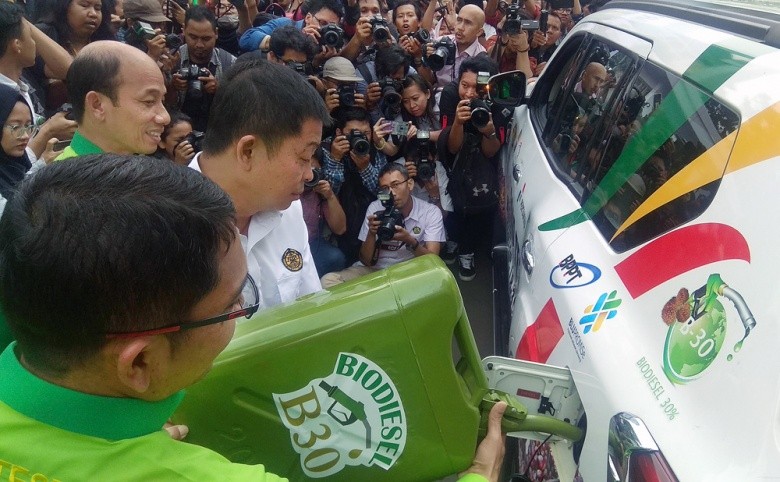Popular Reads
Top Results
Can't find what you're looking for?
View all search resultsPopular Reads
Top Results
Can't find what you're looking for?
View all search resultsLeading by example in sustainable development
We are mindful and vigilant that sustainability may increasingly be used as a guise for protectionism in an effort to undermine the competitive edge of our commodity-based industries.
Change text size
Gift Premium Articles
to Anyone
O
ne of today’s greatest environmental challenges is the pressing need to distinguish between loose rhetoric on sustainability and practical on-the-ground implementation. For the benefit of future generations, the former should be called out, and the latter deserves closer attention and greater support.
Indonesia is not a master of the greening narrative; and as a consequence, we often become the target of negative campaigns against our major commodity exports. In achieving the Paris Agreement and the Sustainable Development Goals (SDGs), we call for a holistic approach to environmental protection, not only by addressing deforestation, but also other challenges such as soil and water contamination.
Unfortunately, such an approach is proving difficult to gain traction.
Negative campaign notwithstanding, Indonesia has prioritized the need to address deforestation by adopting an evidence-based approach while measuring effective progress on the ground.
While this is work in progress, it is accelerating at an impressive pace as Indonesia is now leading by example.
On July 3, 2020, the Norwegian government officially acknowledged the result of an independent verification on Indonesia’s success in reducing CO2 emissions from deforestation and forest degradation of around 17 million tons in 2016-2017 – a size equivalent to one third of Norway’s annual emissions outside the country’s North Sea and Arctic oil exploitation. Under its Reducing Emissions from Deforestation and Degradation (REDD) plus partnership with Indonesia, Norway is expected to provide the first result-based payment worth US$56 million to Indonesia, which is yet to be delivered.
While withholding funds is regrettable, our government’s efforts continue unabated with an average annual national budget of Rp 89.6 trillion ($6.4 billion) from 2016 to 2020 devoted to climate actions, including emission reductions from deforestation and forest degradation.
Balancing the promotion of economic interests, environmental protection and social development is also of utmost importance for Indonesia. This was exemplified by, among other things, President Joko “Jokowi” Widodo’s presidential instruction for a permanent moratorium on the conversion of primary forests and peatland, in which more than 66 million hectares are covered. This approach also applies to the newly enacted Job Creation Law.
On forest fires, Indonesia managed to significantly reduce its hot spots by 91.84 percent in 2020 compared to the previous year. Less than 300,000 ha of Indonesia’s forests and lands were burnt last year, compared to 3.59 million ha in the California wildfire in the United States, 400,000 ha in the European Union and over 2.02 million in the Amazon in the same period, and over 18.6 million ha in Australia fires from June 2019 to May 2020.
While these achievements are seemingly swept aside by negative narratives, the Green Climate Fund has nevertheless approved funding worth $103.8 million for Indonesia’s verified performance in reducing emissions from deforestation and forest degradation for the period of 2014-2016.
Considering this development, it is time to move away from the traditionally apologetic nature of Indonesia’s environmental track record and stand proud as a nation that positively contributes to global sustainability. A nation that leads by example.
Indonesia shows no interest in controlling or sharing the greening narrative of a number of our trading partners, but we are mindful and vigilant that sustainability may increasingly be used as a guise for protectionism in an effort to undermine the competitive edge of our commodity-based industries; especially during the global recession resulting from the COVID-19 pandemic.
The discrimination and false narrative against palm oil is a case in point. Among various vegetable oils, only palm oil benefits from comprehensive and institutionalized sustainability certification schemes, such as Indonesian Sustainable Palm Oil (ISPO), Malaysian Sustainable Palm Oil (MSPO) and the Roundtable on Sustainable Palm Oil (RSPO).
It is the sole crop with clear parameters against which its contribution to sustainability can be measured. Ironically, palm oil continues to be the target of negative campaigns, while threats posed by all other vegetable oils to the environment, including land degradation, excessive use of pesticides and river pollution, are invariably overlooked.
Research shows that replacing palm oil with any alternative vegetable oil would require up to 10 times more land to produce the same quantity of vegetable oil. If deforestation is truly our common goal, palm oil and its certification schemes should be supported.
While facing these double standards, Indonesia remains committed to sustainable development.
On energy transition to biofuels, the fact that Indonesia has reached its B-20 target, and is soon to enter the B-30 phase, is of global significance. In fact, Indonesia has reached the capability to produce 100 percent plant-based fuels through its D-100 program.
Indonesia has been a global champion of such initiatives as the Coral Reef Triangle, combating illegal, unreported and unregulated fishing, and restoring over 2.49 million ha of peatland over the past five years.
Investment in new, renewable energy and energy conservation in Indonesia reached an impressive $1.36 billion in 2020, mostly deriving from investments in geothermal and hydroelectric. The sector also contributed to the reduction of 64.4 million tons of CO2 emissions.
Indonesia’s experiences show that developing countries can, will and are ready to contribute and lead by example. Developed nations can also lead by example by fulfilling their commitments on global partnership – an important element of the SDGs and the Paris Agreement that is yet to be fully realized. Implementing our respective international commitments and obligations is undeniably crucial as we work toward realizing a green and sustainable world.
However, we can only do so by casting loose and false rhetoric aside and measuring real progress on the ground.
***
Mahendra Siregar is deputy foreign minister and Alue Dohong is deputy environment and forestry minister.










